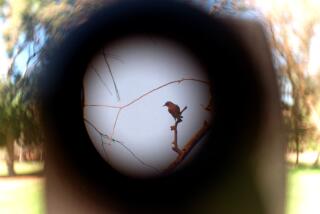BOOK REVIEW : A Simple Story ... With Magic : BIRD OF PARADISE<i> by Vicki Covington</i> Simon & Schuster $18.95, 217 pages
- Share via
This is one of those novels that’s about several things at once. While it looks simple on the surface, it keeps you up at night trying to figure out what, in fact, the author is trying to say. “Bird of Paradise” looks like a story about nice senior citizens in a small Alabama town. But don’t worry: It isn’t about that at all.
The narrator, Honey Shugart, is a lady in her 70s. (Read “Sugar” for that last name.) Widowed for 30 years, Honey still vividly remembers Scotty, her husband, a raving alcoholic, who--in spite or because of everything--she dearly loved. Honey’s life changed long ago when she began to go to Alanon meetings. She took the bus into the city of Birmingham to do it, back in the days when segregation was just breaking up, and so her life changed two ways. Honey rode with blacks in the back of the bus, trembling with fear. When she got to the big city, she learned from Alcoholics Anonymous (in the words of the Third Step of that Twelve-Step Program) to “make a decision to turn her will and her life over to the care of God as she understood Him. “
Now, more than 40 years later, Honey lives out her existence as a participating member of two Larger Worlds: that which occurs on Earth and that which goes on in the Kingdom of God. For Honey, the two are inextricably combined. Her friends--couples and widows whom she’s known her whole life--are devout and decent and kind, and far more orthodox than Honey. Their lives seem to be generic senior-citizen stuff: “Sunday is church. Monday is bingo at the Family Life Suite. Tuesday is nursing-home visits. Wednesday is senior citizens’ choir practice, study club and covered-dish prayer meeting (Wednesday is a big day for Baptists, nigh near busier than Sunday). Thursday is Meals-on-Wheels delivery, Friday is quilting and Saturday is open.”
But all that quiet routine glows with magic. For one thing, because of their down-to-earth faith, Honey’s friends mostly look good and stay happy: “Faith in God,” Honey remarks, “frees you for the most part--I’d say 90% free--from the fear of death, and surely that keeps you looking young.” For another thing, Honey is certain that her best friend, Carmen Dabbs, is a genuine Angel on Earth. Whether Carmen is a shure-enough angel, she’s the one who traipses around in fashionable boots and reminds the rest of her crowd of their moral obligations: the Civil Rights Movement, the Greenhouse Effect and so on.
Third and finally, it was the Third Step of the Twelve-Step Program that changed things for Honey. I’ll lay dollars to doughnuts, that’s what “Bird of Paradise” is about. If a giant crowd of alcoholics, addicts and all their families--a whole, huge, international generation of emotionally troubled and spiritually starved people--have given themselves the freedom to trust in God as they understand Him , gently shoving aside Jehovah, the Holy Trinity or some other notion of God, then not only have a lot of happy alcoholics stopped drinking, and their families calmed down, but uncounted human beings, on an individual basis, must have made their peace with the Big Mystery, the Larger Scheme of Things. An interesting idea! To my knowledge, nobody has written about it before.
Thus, Honey is sure clouds are angels and have a mission. She’s sure Jesus was a nice young man but probably not divine. She agrees when Carmen says: “I’ve never known a tranquil Atheist. Don’t they always look like they just sat on a tack?”
With easeful faith such as this, Honey always wears clothes that look good on her. She makes a knock-out sweet potato casserole. And when a handsome, agnostic, wealthy man comes back from the city to settle in her small town, Honey, because she has so matter-of-factly turned her will and her life over to the Lively Universe, is able to accept whatever comes with marvelous equanimity. This is a book about wide horizons, perfect freedom and lovely life. I liked it a lot.
Next: Lee Dembart reviews “The Literary Companion to Science,” edited by Walter Gratzer (W.W. Norton).
More to Read
Sign up for our Book Club newsletter
Get the latest news, events and more from the Los Angeles Times Book Club, and help us get L.A. reading and talking.
You may occasionally receive promotional content from the Los Angeles Times.








